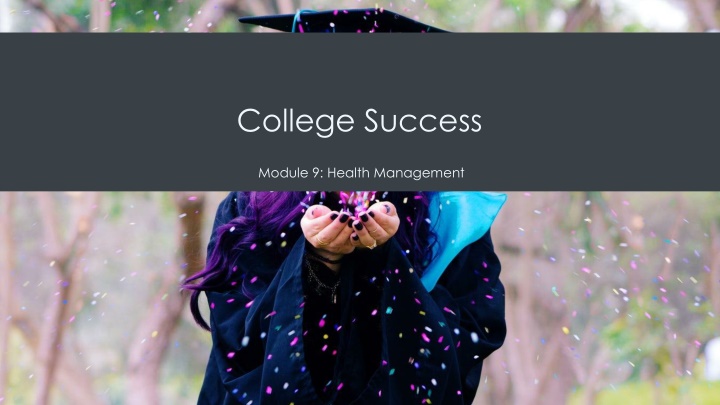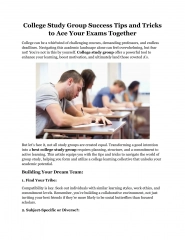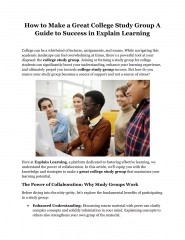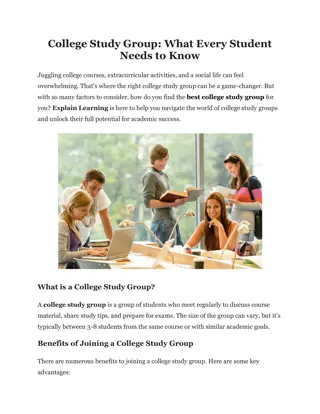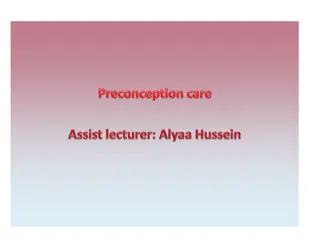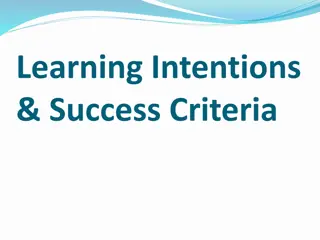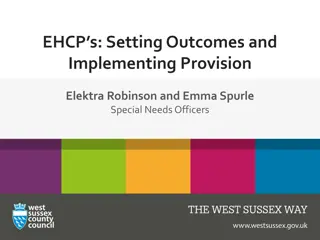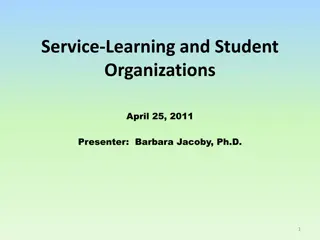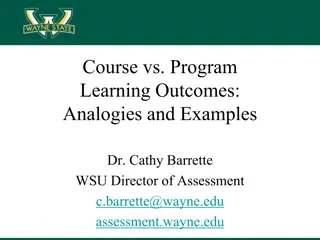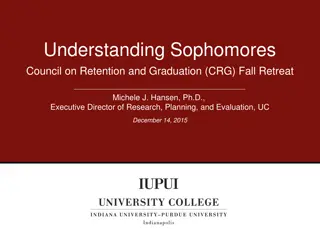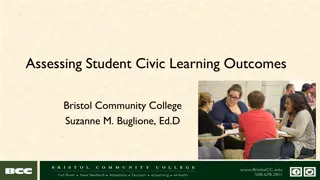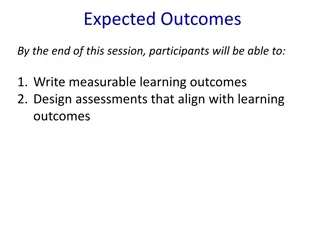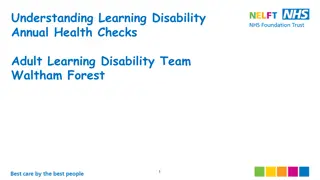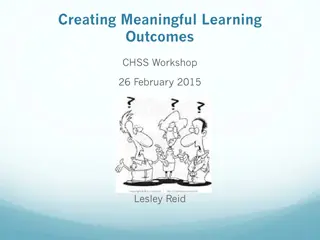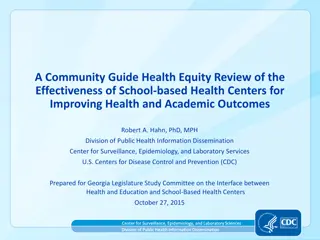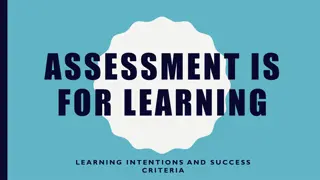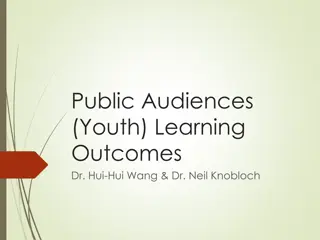College Success: Health Management Learning Outcomes
The importance of nutrition and exercise in college life. Learn about healthy eating habits, benefits of regular exercise, and long-term health advantages. Discover practical strategies for maintaining a balanced lifestyle amidst common challenges faced by students."
Download Presentation

Please find below an Image/Link to download the presentation.
The content on the website is provided AS IS for your information and personal use only. It may not be sold, licensed, or shared on other websites without obtaining consent from the author.If you encounter any issues during the download, it is possible that the publisher has removed the file from their server.
You are allowed to download the files provided on this website for personal or commercial use, subject to the condition that they are used lawfully. All files are the property of their respective owners.
The content on the website is provided AS IS for your information and personal use only. It may not be sold, licensed, or shared on other websites without obtaining consent from the author.
E N D
Presentation Transcript
College Success Module 9: Health Management
How can a lifestyle inventory help you with your study habits?
Learning Outcomes: Nutrition 9.1.1 Define healthy eating habits 9.1.2 Identify techniques for making healthy food choices, especially in college
Healthy Diets USDA Healthy Eating Guidelines: Make half your plate fruits and vegetables Make half your grains whole grains Vary your protein routine Move to low-fat or fat-free dairy Drink and eat less sodium, saturated fats, and added sugars Eat the right amount
Healthy Eating in College College offers many temptations for students trying to eat a healthy diet. Overeating or not eating enough is a common response to stress for college students. Being on a tight budget (money and time wise) can also make it easier to eat cheap fast food.
Learning Outcomes: Exercise 9.2.1 Describe physical fitness and the major types of exercise 9.2.2 Identify the benefits of regular exercise, for both body and brain
Regular Exercise Regular exercise has long term health benefits: reduced risk of chronic disease increased ability to sleep at night helps with weight control Most people can improve their health and quality of life through a modest increase in daily activity
Benefits of Exercise Longevity: Moderately fit people- even if they smoke or have high blood pressure- have a lower mortality rate than the least fit. Avoiding Diabetes: Even if you do not lose weight your risk for diabetes is lowered if you exercise. Brain, Improves your mood, memory, and creativity Exercise can help keep depression and anxiety at bay. Exercise and the Brain Sign up for our WellCast newsletter for more of the love, lolz and happy! http://goo.gl/GTLhb Everyone knows that working out is great for your health. Exercise helps with weight loss, keeps your heart healthy and your blood pressure down. But did you know exercise also helps with mental health? Today we explore the myriad benefits of exercise on your brain, and give you a chance to clear the path to mental health right away! Check out some other awesome episodes of WellCast: 1. Coming Out http://goo.gl/amysN 2. Coping With Grief http://goo.gl/aD4OH 3. How to Break the Ice http://goo.gl/CmS8O 4. Dealing With Rejection http://goo.gl/f3Pw5 5. Party Survival Guide for Introverts http://goo.gl/WYZVe ABOUT WELLCAST: In this twice-a-week show, we explore the physical, mental and emotional paths to wellness. With an emphasis on education, the show addresses both the latest trends and long-standing practices of wellness everything from the efficacy of the gratitude experiment to the importance of sunshine and vitamin D. Follow along as your host, Kate, guides you through a bi-weekly journaling exercises that helps you apply what you've learned. The ultimate goal: one year, one show, one journal, one collective journey to wellness. Like us on Facebook! http://goo.gl/0DHVJ Follow us on Twitter! http://goo.gl/Ylcv6 Find us on Google+ http://goo.gl/ylCVT Follow us on Tumblr! http://goo.gl/Ds3TB Follow us on Instagram! http://goo.gl/q3IUC Follow us on Pinterest! http://goo.gl/lNhu2
Practice Question: Exercise What are some of the opportunities that your college offers for getting regular exercise? With a partner, do a search of your college s website to find opportunities to get exercise on campus. Record links and information to share with the class.
Learning Outcomes: Sleep 9.3.1 Identify benefits of sleep for both physical and mental health 9.3.2 Identify ways to ensure good sleep habits and high-quality sleep, especially during periods of stress
The Benefits of Sleep Why is it important as a college student to get a good night's sleep? Sleep deprivation is dangerous; as dangerous or more dangerous than being intoxicated!
Falling Asleep Tips to get asleep, stay asleep, and feel rested when you wake: Set a schedule Exercise Avoid caffeine, nicotine, and alcohol before bed Relax before bed Sleep until sunlight Don t lie in bed awake Control your room temperature Screen out noise and light
Learning Outcomes: Substance Abuse 9.4.1 Define substance abuse and markers for substance abuse risk 9.4.2 Describe the effects of alcohol use and abuse on the body 9.4.3 Compare the effects of prescription and illegal drug use and abuse on the body 9.4.4 Identify resources for further information and guidance about substance abuse
Substances and Tobacco Effects of cigarettes and tobacco on the body and brain: lung disease mouth cancer heart and blood problems hurts babies addiction There are medicines, treatments, and hotlines to help those addicted to tobacco quit.
Alcohol Effects of Alcohol on the Body and Brain: interference with the brain s communication pathways high blood pressure liver disease pancreatitis (inflammation of the pancreas) cancer a weakened immune system
Drugs Marijuana Cocaine Heroin Meth Prescription Pain Medicine Other drugs of abuse Ecstasy K2 LSD PCP Inhalants Club Drugs
Where to Go for Help If your use of drugs or alcohol is interfering with your life, it is time to seek help. Visit the student health center or talk with your college counselor.
Learning Outcomes: Stress 9.5.1 Identify sources and signs of stress, particularly for college students 9.5.2 List healthy ways of managing stress that fit your current lifestyle
Causes of Stress Stressed is characterized by symptoms of physical or emotional tension. Stress can be positive or negative. Social support and self care are very important Stress is good when it motivates you to develop the skills necessary to manage challenging situations in life, but it is harmful when it is severe enough to make you feel overwhelmed and powerless.
Ways of Managing Stress Avoid drugs and alcohol Manage your time Find support Connect socially Slow down and cut out distractions for a while Take care of your health
Class Activity: Getting help Where on campus can students get help if they need it? Imagine you have a friend who is struggling with her level of stress. Where would you advise her to get help? What resources on campus should she use? Take notes of links and resources that you can share.
Practice Question: Stress What are ways that you deal with stress? What helps you when you feel stressed about your classes? Use examples from the reading to agree or disagree with to support your discussion.
Learning Outcomes: Mental Health 9.6.1 Describe mental health basics and strategies for improving mental health 9.6.2 Describe depression 9.6.3 Describe eating disorders 9.6.4 Describe anxiety disorders 9.6.5 Identify suicide warning signs and resources for further information about mental health issues
Mental Health Basics Positive mental health can increase your physical health. Mental health is a state of well-being in which the individual realizes his or her own abilities, can cope with the normal stresses of life, can work productively and fruitfully, and is able to make a contribution to his or her community.
Depression and Loneliness Depression is common but serious. It causes severe symptoms that affect how you function in day to day life. Although severe, depression is treatable- seek help if you need it! Loneliness is very common among first-time college students
Eating Disorders Anorexia Nervosa Bulimia Nervosa Binge Eating Disorder
Anxiety People with anxiety disorders respond to certain objects or situations with fear and dread. An anxiety disorder is diagnosed if a person: Has an inappropriate response to a situation Cannot control the response Has an altered way of life due to anxiety
Suicidal Behavior What are the warning signs of suicide? 112 americans die everyday from suicide 9.4 million adults have had thoughts of suicide in the past 12 months Suicide is the second-leading cause of death among 15-24 year olds
Learning Outcomes: Sexual Health 9.7.1 Describe types of sexually transmitted diseases and how to prevent STDs or unintended pregnancies 9.7.2 Identify risks of sexual assault, including date rape, and where to go for help
Sexually Health What are the most common STDs? Anyone who is sexually active can get an STD How can you protect yourself against STDs? Unplanned pregnancy 7 in 10 pregnancies in single women 18-29 are unplanned Abstinence is the only method that it was 100% reliable If you are sexually active, there are other options
Sexual Assault 1 in 5 women is sexually assaulted while in college 80% of female rape victims experience their first rape before age 25 Beware of date rape drugs Alcohol and other drugs can also put you in a vulnerable position
Learning Outcomes: Safety 9.8.1 Describe safety consciousness 9.8.2 Describe strategies for staying safe on campus and elsewhere
Safety Consciousness This is a term describing your awareness of hazards, and your alertness to potential danger. In order to have safety consciousness, you must value safety no matter where you are or what time of day it is. All schools receiving federal student aid must disclose crime information about the areas in and around your campus. This is known as the Crime Awareness and Campus Security Act.
Practice Question: Safety on Campus If you need help on campus, what do you do? Find information on your college s website about what to do when you need help.
Strategies for Staying Safe Ask questions! Don t hesitate to take advantage of campus and community resources Download safety apps bSafe Circle of 6 U OnWatchOnCampus React Mobile Watch Over Me If you see something, do something
Quick Review A healthy diet and a good amount of sleep is essential to optimal performance in classes Regular exercises increases mental health as well as physical health Know where to seek help for alcohol and substance abuse Understand ways of managing stress Recognizing the signs of suicidal behavior Practice sexually healthy behaviors Know and use the strategies for staying safe
